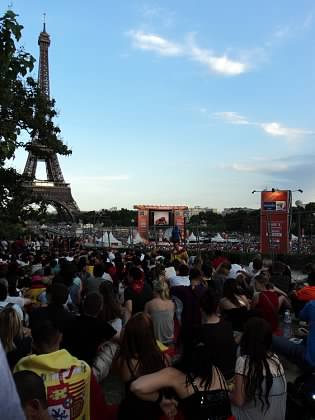Two years ago I found myself in Paris, France for the world cup final. One of the girls at my hostel was crazy about soccer and we decided to trek down to the Fifa fan zone near the base of the Eiffel Tower to watch — one of the most scenic places in the world to watch a game. We only got there about half an hour before the game started and were unable to get seats in the actual fan zone, so we stood along the edges with an alright view of the screen. The French crowed seemed to be about eighty per cent supporters of Spain.
Two minutes before the game started a Parisienne man and a couple of his friends stood directly in front of myself, my friend and a Dutch man residing in Paris. Me and the Dutch man proceeded to ask the Parisienne to leave as we had gotten there first. Fortunately, we both spoke fluent French. Unfortunately, the argument to convince him to leave lasted fifteen minutes. One of the downsides of Paris is that an argument is a commitment and it is not possible to simply tell an individual that they have done something rude and ought to leave/make amends — this is probably exacerbated by the fact that only a certain type of individual does rude things in the first place. I was pleasantly surprised that I was able to have a fifteen minute argument entirely in French. After convincing him that he was not entitled to stand wherever he pleased and strategic foot shuffling practiced at several standing room only concerts he left, and my attention turned once again to the screen and the game that I gone to watch.
As the game went on (and our view of the screen was not great) we could sense a restlessness in the crowd and decided to leave at half-time — it was for the best that we did as a few cars were ablaze as we walked past a couple of hours later. As we headed off away from the Eiffel Tower into the streets of Paris we searched for a place that we could watch the game. Unfortunately, there were no bars or restaurants nearby and we began asking locals where we could watch the game or as a rough translation le jeu. They were bewildered and confused by this question. The idea of watching the game is an expression that is ubiquitous in the English language and I had assumed that it would translate for a sport loving country like France. We had to explain to each person we asked that we were looking for a bar or a restaurant in which we could the world cup final, another idea that seemed to confuse many. Eventually we did manage to find a restaurant with a very tiny screen to watch extra time in our own North American way.
